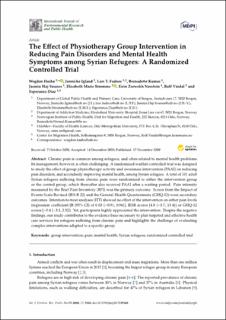| dc.contributor.author | Hasha, Wegdan | |
| dc.contributor.author | Igland, Jannicke | |
| dc.contributor.author | Fadnes, Lars T. | |
| dc.contributor.author | Kumar, Bernadette N | |
| dc.contributor.author | Haj Younes, Jasmin | |
| dc.contributor.author | Strømme, Elisabeth Marie | |
| dc.contributor.author | Norstein, Eirin Zerwekh | |
| dc.contributor.author | Vårdal, Rolf | |
| dc.contributor.author | Diaz, Esperanza | |
| dc.date.accessioned | 2021-06-01T10:20:10Z | |
| dc.date.available | 2021-06-01T10:20:10Z | |
| dc.date.created | 2021-01-16T17:40:16Z | |
| dc.date.issued | 2020-12-17 | |
| dc.identifier.citation | International Journal of Environmental Research and Public Health (IJERPH). 2020, 17 (24), 1-15). | en_US |
| dc.identifier.issn | 1661-7827 | |
| dc.identifier.uri | https://hdl.handle.net/11250/2757190 | |
| dc.description.abstract | Chronic pain is common among refugees, and often related to mental health problems. Its management, however, is often challenging. A randomized waitlist-controlled trial was designed to study the effect of group physiotherapy activity and awareness intervention (PAAI) on reducing pain disorders, and secondarily improving mental health, among Syrian refugees. A total of 101 adult Syrian refugees suffering from chronic pain were randomized to either the intervention group or the control group, which thereafter also received PAAI after a waiting period. Pain intensity measured by the Brief Pain Inventory (BPI) was the primary outcome. Scores from the Impact of Events Scale-Revised (IES-R 22) and the General Health Questionnaire (GHQ-12) were secondary outcomes. Intention-to-treat analyses (ITT) showed no effect of the intervention on either pain levels (regression coefficient [B {95% CI} of 0.03 {−0.91, 0.96}], IESR scores [4.8 {−3.7, 13.4}] or GHQ-12 scores [−0.4 {−3.1, 2.3}]). Yet, participants highly appreciated the intervention. Despite the negative findings, our study contributes to the evidence base necessary to plan targeted and effective health care services for refugees suffering from chronic pain and highlights the challenge of evaluating complex interventions adapted to a specific group. | en_US |
| dc.language.iso | eng | en_US |
| dc.publisher | MDPI | en_US |
| dc.relation.ispartofseries | International Journal of Environmental Research and Public Health (IJERPH);volume 17, issue 24 | |
| dc.relation.haspart | International Journal of Environmental Research and Public Health (IJERPH) | en_US |
| dc.rights | Navngivelse 4.0 Internasjonal | * |
| dc.rights.uri | http://creativecommons.org/licenses/by/4.0/deed.no | * |
| dc.subject | Group interventions | en_US |
| dc.subject | Pain | en_US |
| dc.subject | Mental health | en_US |
| dc.subject | Syrian refugees | en_US |
| dc.subject | Randomized controlled trials | en_US |
| dc.title | The effect of physiotherapy group intervention in reducing pain disorders and mental health symptoms among syrian refugees: A randomized controlled trial | en_US |
| dc.type | Peer reviewed | en_US |
| dc.type | Journal article | en_US |
| dc.description.version | publishedVersion | en_US |
| dc.rights.holder | © 2020 by the authors. | en_US |
| cristin.ispublished | true | |
| cristin.fulltext | original | |
| cristin.qualitycode | 1 | |
| dc.identifier.doi | https://doi.org/10.3390/ijerph17249468 | |
| dc.identifier.cristin | 1872544 | |
| dc.source.journal | International Journal of Environmental Research and Public Health (IJERPH) | en_US |
| dc.source.volume | 17 | en_US |
| dc.source.issue | 24 | en_US |
| dc.source.pagenumber | 1-15 | en_US |
| dc.relation.project | The Norwegian Research Council, BEHANDLING: 269835/H10. | en_US |

